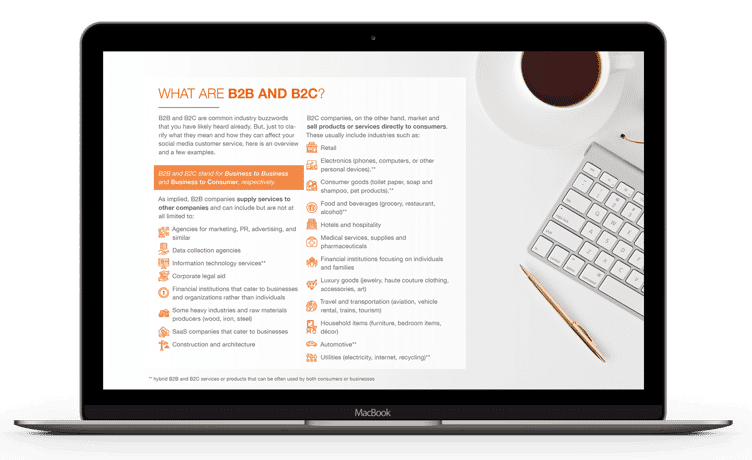The perfection of your social media customer service game hinges on adapting your processes to the type of business you're running. Social media strategies for B2B and B2C companies and the products or services they provide will inevitably vary and there is very rarely a one-size-fits-all solution.
In order to optimize our customer support strategies, we have to recognize where our businesses fall in this range and how to adapt or scale our efforts accordingly.
To give you a better picture, we'll talk about:
-
The differences between and examples of B2B and B2C business types
-
What B2E companies are and how they function differently
-
Why the distinction between these is important for your business's social media customer service
What are B2B and B2C?
B2B and B2C are common industry buzzwords that you have likely heard before. But, just to clarify what they mean and how they can affect your social media customer service needs, here is an overview and a few examples.
B2B and B2C stand for Business to Business and Business to Consumer, respectively.

As implied, B2B companies supply services to other companies and can include but are not at all limited to:
-
Agencies for marketing, PR, advertising, and similar
-
Data collection agencies
-
Information technology services**
-
Corporate legal aid
-
Financial institutions that cater to businesses and organizations rather than individuals
-
Some heavy industries and raw materials producers (wood, iron, steel, or rare earth minerals)
-
SaaS companies that cater to businesses
B2C companies, on the other hand, market and sell products or services directly to consumers. These usually include industries such as:
-
Retail
-
Electronics (phones, computers, or other personal devices).**
-
Consumer goods (toilet paper, soap and shampoo, pet products).**
-
Food and beverages (grocery, restaurant, alcohol)**
-
Hotels and hospitality
-
Medical services, supplies and pharmaceuticals
-
Financial institutions focusing on individuals and families
-
Luxury goods (jewelry, haute couture clothing, accessories, art)
-
Travel and transportation (aviation, vehicle rental, trains, tourism)
-
Household items (furniture, bedroom items, décor
-
Automotive**
-
Construction and architecture**
-
Utilities (electricity, internet, recycling)**
Hybrids - the B2Es
Note that some of the industries listed above are marked with asterisks (**). These items are considered hybrid B2B and B2C services or products that can be often used by both consumers and businesses.
While not an official marketing term, for the purposes of this article they will be referred to as B2E – Business to Everyone.
B2E industries may include:
Food and beverages. While these industries may lean more heavily toward B2C, companies also find themselves in need of regular supplies of this type for restaurants, catering, company events, business meetings, or simply stocking company kitchens. This same point can also be made for many consumer goods. Many companies will order these products in bulk from wholesalers. Wholesaling is almost exclusively B2B.
Automotive. While most vehicles are sold to individuals, many are not. Other markets for the automotive industry include tourism and rental agencies, agriculture, or company vehicles. In some cases, it could also include municipal transport (buses), government vehicles such as postal services and police, and even the military. Yes, for all intents and purposes, we can call those businesses!
Utilities and rent. Companies need to pay their bills too, and electric companies, property managers, and others may also fall under this category. In places where services such as water or waste disposal are provided by governments rather than private companies, they may not be considered businesses. This can vary from location to location.
Electronics and IT. Individuals and companies both require technology to function. Computers, phones, printers, and many other devices, as well as the IT services that go with them, are equally important across the board.
Real estate. Every person needs a home, and so does every business. In both cases, real estate companies provide the land on which we all reside, regardless of our purposes.
There are many, many other types of B2B, B2C, and B2E businesses than just those listed here. If you're uncertain as to where your own company falls on this spectrum, just think about who your customers or clients are.
Why does this distinction matter for social media customer service?
Depending on your industry, the needs and expectations of your social media customer service could vary considerably. For example, a B2B social media customer service may need a more thorough, drawn-out, and expert customer service experience.
Customer service requirements for B2B and B2C companies could vary wildly from someone asking about making a return at your retail outlet, to a platinum-subscription client struggling to find a specific feature of the software for which they pay a premium.
In the former case, a social media manager could likely offer a simple, concise response directing the customer to the online returns section of their website by supplying a link to a form. The customer may sometimes be willing to wait a little bit longer for a reply, as well.
In the latter case, the marketing manager whose company is paying a huge sum of money every month may expect an immediate response that comes with highly detailed instructions and perhaps a call with their client partner.
Additional requirements that B2B customer service on social media may require are stronger, long-term relationships between company and client, more in-depth product knowledge on the part of customer service teams, a lower volume of messages, and more specific online communities than their B2C counterparts.
It should be noted that the likelihood of our hypothetical marketing manager reaching out to their software provider with a direct message on Instagram is pretty low, but social media customer service is increasing in functionality and popularity every day, and your company should be prepared for the possibility of a paradigm shift in such communication pathways, even for B2B companies. 
A B2E company may also meet a number of unique challenges. It might itself be using multiple customer service lines specifically for individual consumers and larger enterprises. It may also need to tweak its public image and tone during interpersonal communications.
In the case of larger companies, there could even be multiple social media profiles and teams for the same platforms. A good example of this are Amazon and Facebook, which keep separate social media accounts for the general population, as well as accounts that are specifically for entities that use their business suites. Other strong examples include office supply stores, such as Staples Inc., which markets supplies designed for everything from industrial printers to Spider-Man backpacks.
Remember: the majority of customer service messages or comments on social media platforms such as Instagram, Facebook, or Twitter will likely be targeted at B2C industries. This is gradually shifting as social media becomes more accepted as a business tool, but for now is still true. B2B companies may experience more engagement on LinkedIn.
Your B2B or B2C social media customer service strategy will inevitably vary depending on the type of business you're running.
Wherever your company falls on this spectrum, we've gone ahead and created pre-made social media response templates for companies in need of fast, convenient responses.
This free download features generic and customizable social media replies written by English native speakers that you and your customer service team can take advantage of.
Download your free social media customer service responses here.











